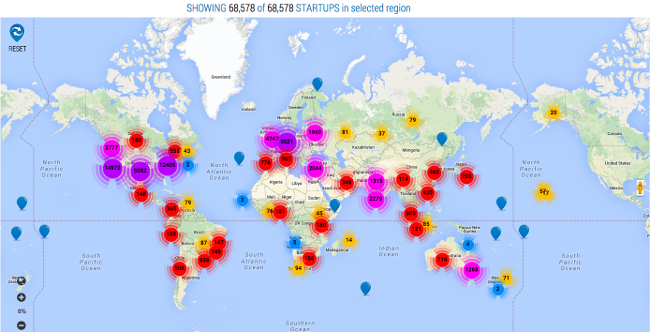'Digital nomad' Eli David
Eli David, a digital nomad who changes country every two months, is on a mission to map the world’s start-ups on StartupBlink and right now has his finger on the pulse of 68,000 start-ups and founders worldwide.
The fast-growing start-up landscape is already vast when you consider the ecosystem of founders, accelerators, co-working spaces, venture capitalists, freelance contractors, designers, you name it.
But David, an Israeli digital nomad who lives in a different location every two months, and his co-founder Roderick Warren are on a mission to map every start-up on earth.
The Switzerland headquartered StartupBlink broadcasts new additions in “blinks” and the service has been hailed by start-up influencers including Guy Kawasaki. The map even includes influencers including Ben Horowitz and Steven Sinofsky.
The map currently has located 68,000 start-ups, 100 accelerators and 200 co-working spaces and continues to grow.
Visualising the start-up world

“We aim to create a valuable resource that will be used frequently by the global start-up ecosystem. Our focus is start-up information and start-up connection. We want StartupBlink to become a leading platform in those two fields and facilitate finding valuable information on start-ups, and also allow co-founders to connect to all relevant resources such as other co-founders, service providers, investors etc via the platform.
“The best tactic for us is to create constant user involvement that will keep the map fresh with recent data and we are doing that by various features that encourage users to repeat and update on their latest status, including the blink tool which is an internal communication and broadcasting platform within the site.
“We plan to soon map start-up events of all kinds on the map, add investors, board members, reporters and much more.”
David says visualisation and user experience are critical to the project. “We are allowing people to visualize the information other than giving it in the form of a long list. This encourages founders to add their info on the map and allows investors and other interested parties to screen information by location and industry.”
Joining the dots
While there are a myriad of start-up resources emerging every day, including long-standing resources like the CrunchBase database, David says start-ups are under enough pressure to build up the information they need.
“There are so many start-up related sites out there, each catering for a specific need. For example, investor and getting funded platform, event platform, finding office place and accelerator platform, finding co-founder sites and much more. We want to connect the dots together, and create a one stop shop of start-up information. This will make start-ups lives easier.
“We are traveling a lot and use StartupBlink to get the entire updated picture on a specific location, as for the start-ups, influencers, co-working spaces, accelerators, top service providers and much more.”
In his travels he has met a lot of founders of start-ups and already can guess why some go the distance and others fail.
“The most important qualities are starting and executing. Many potential founders don’t make the jump to the water, and when they do, they stop swimming way too early. I think the most important elements for a founder is the ability to take decisions, be proactive and stick to those decisions.”
Bubbles and zombies
The speed of some start-ups such as Uber to become valued at in excess of US$40bn, WhatsApp to be acquired by Facebook for US$22bn and Snapchat to become valued at US$19bn, is frightening if you are worried that a bubble exists and is about to pop.
But David says it is a case of fast will eat the slow or strongest survive and that failure is inevitable.
“Bubbles tend to burst, so even if there is a bubble, it will fix itself.”
However, he believes some countries in Europe, including Ireland, are making it too easy to start companies and too little focus is on companies going the distance.
“In some places getting funded is too easy, and to be quite honest, as someone from Israel, after spending three months in Ireland, it seemed to me that your government is too involved, indulging and supportive of start-ups.
“Yes, this is a problem in my opinion that will create start-up zombies at the expense of unnecessary public spending. Start-ups that can’t get private funding should die instead of being on life support by government agencies. They should actually die fast for the benefit of all parties involved.
“I am not sure I got the complete picture of the Irish start-up ecosystem, and I have met outstanding people like John Breslin in Galway who have the start-up spirit that pushes an entire community forward but at the same time, seeing the government getting involved in the start-up ecosystem is for me self-defeating.
“However, I stress again that this is only intuition, and I can’t really validate my assumptions without spending more time in Ireland. The winter scared me off, summer is much better for start-ups.”
David is a digital nomad on a start-up crusade and he says the decision to up roots ever two or so months is enlightening and invigorating.
“I have been a digital nomad for more than four years now. I am changing countries every two months or so, and have lived in more than 20 countries during this period. I work most of the day, and I am a co-working fanatic, and would like to send my regards to the excellent Galway Institute of Technology where I co-worked for more than two months.
“The constant change is awakening, and allows me to meet interesting entrepreneurs from around the world while working on my own start-ups.”